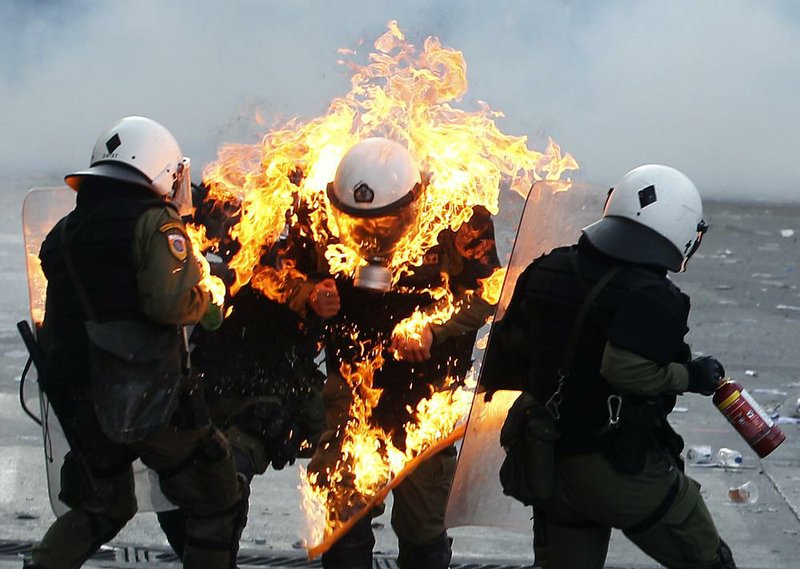ATHENS, Greece — Greek lawmakers passed a deeply resented austerity bill Thursday, yielding to the demands of international creditors in order to avoid a national bankruptcy, as a second day of riots left one protester dead and more than 100 people injured.
The austerity measures passed 154-144 in the 300-member Parliament despite dissent from a prominent Socialist lawmaker who voted against a key article of the bill. The vote was expected to pave the way for an $11 billion payout from creditors within weeks so Greece can stay solvent.
READ MORE
http://www.arkansas…">Europe economic crisis
Clouds of tear gas choked central Athens ahead of the vote as riot police intervened to separate rival demonstrators who fought for several hours with firebombs and stones outside Parliament.
A 53-year-old construction worker died of heart failure after attending a mass rally, while 74 protesters and 32 police officers were hospitalized with injuries, police and state hospital officials said. Several dozen more injured protesters received first aid from volunteer medics who set up a makeshift treatment site on Athens’ main Syntagma Square.
Police said they detained 79 people suspected of violent conduct.
After initial hours of calm, the rioting broke out when hundreds of masked anarchist youths attacked a peaceful rally of about 50,000 people outside Parliament, pelting them with firebombs and jagged chunks of marble. The Communist-backed union members counterattacked, and chaos ensued as the two sides fought with sticks and rocks before riot police fired volleys of tear gas to separate them.
Running battles ensued through the avenues and side streets of central Athens, with anarchist rioters ripping up paving stones, hewing masonry from buildings and using garbage to set up burning barricades.
Unions kept the country’s services crippled on the second day of a general strike, in opposition to the new measures that include pay and staff cuts in civil service as well as pension cuts and tax increases for all Greeks.
Former Labor Minister Louka Katseli voted against one article that scales back collective-bargaining rights for workers.
Although Katseli voted in favor of the overall bill, Prime Minister George Papandreou expelled her from the party’s parliamentary group, whittling down his parliamentary majority to a bare three seats - down from 10 seats two years ago.
Passing the entire bill was “a matter of national responsibility for the critical negotiations that lay ahead in the next few days,” Papandreou said in a prepared statement announcing Katseli’s expulsion. “The government exhausted every possible effort to incorporate proposals made by members of Parliament.”
TOUGH TALKS
Greece now heads into a series of tough negotiations in Brussels involving the 17 finance ministers of the eurozone and European leaders. The meetings kick off today, when eurozone finance ministers gather, with the finance ministers of the full 27-nation European Union in talks Saturday, and the EU heads of state and government Sunday.
Greece has avoided bankruptcy only with a $152 billion bailout loan from its 16 eurozone partners and the International Monetary Fund since May of last year. Creditors worried about Greece missing budget targets had demanded that Athens pass extra austerity measures before it gets the next payout. Greece says it will run out of money in mid-November without the next $11 billion installment.
Gerry Rice, the IMF’s acting director for external relations, in Washington on Thursday said the IMF is working on Greece “very closely” with the European Commission and European Central Bank and there is “no divergence” among the three.
Greece’s debt ratio, which exceeded 140 percent of gross domestic product at the end of 2010, will remain “at very high levels for many years,” leaving it “vulnerable to adverse shocks,” according to a draft report by the IMF, European Commission and European Central Bank.
In Athens, deputies voted after an acrimonious debate held as rival groups of demonstrators outside fought police and each other in a second day of violence.
“That it was voted on is one thing. Its implementation is another. The people will tear it apart, they will dismiss it in practice,” retiree Kleanthis Kizilis said at the protest.
The meetings on Greece this weekend are crucial because the efforts so far to get the country back on track financially have been failing. In July, eurozone leaders tentatively agreed to a second $150 billion bailout for Greece, conceding that the first was not enough.
That second bailout would also see banks and other private bondholders give Greece easier terms on its debt. European banks that hold Greek bonds are fighting efforts to make them accept larger losses, and many experts are concerned about the ability of European banks to handle a Greek default.
But Greece’s international creditors are warning that even the second bailout may not be enough to save the country from bankruptcy, according to a draft of a debt inspectors’ report obtained Thursday by the Associated Press in Berlin.
The inspectors said Greece has missed its deficit-cutting targets and called the pace of its policy changes insufficient.
But they added that Athens should get the next payment as soon as possible so it does not default.
PAPANDREOU PLEA
Papandreou urgently called on Greece’s eurozone partners to end a deadlock in negotiations over a broader European debt deal.
“Europe is now at risk because of its inability to grasp the scale of the crisis in time - the systemic problems - and take the necessary decisions,” he said at an emergency Cabinet meeting in Athens.
“Europe must now assume its responsibilities - all of us in Europe. A small fire has become a pan-European fire.”
But fury at his government echoed across Athens.
“He [Papandreou] doesn’t know what is going on. For me, it’s the worst government of all time,” protester Haralambos Tahoulas said.
Information for this article was contributed by Demetris Nellas and Elena Becatoros of The Associated Press and by Ian Katz of Bloomberg News.
Front Section, Pages 1 on 10/21/2011

